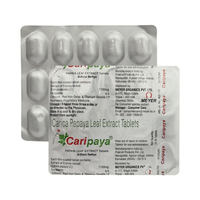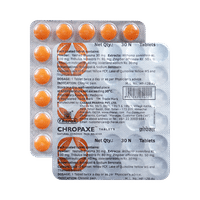Rs.323for 1 strip(s) (10 tablets each)
food interaction for Tamik BC
alcohol interaction for Tamik BC
pregnancy interaction for Tamik BC
lactation interaction for Tamik BC
food
alcohol
pregnancy
lactation
Tamik BC Tablet should be taken with or after food.
None
None
CAUTION
It is unsafe to consume alcohol with Tamik BC Tablet
UNSAFE
The safety of Tamik BC Tablet during pregnancy has not been established. There are no adequate and well-controlled studies in pregnant women, and animal data on reproductive toxicity are insufficient. Your doctor will weigh the benefits and any potential risks before prescribing.
CONSULT YOUR DOCTOR
Information regarding the use of Tamik BC Tablet during breastfeeding is not available. Please consult your doctor.
CONSULT YOUR DOCTOR
SALT INFORMATION FOR Tamik BC
Tranexamic Acid(500mg)
Uses
Tranexamic Acid is used in the treatment of bleeding. It is used to prevent or reduce bleeding for short period of time in conditions like heavy periods, dysfunctional uterine bleeding, nosebleed, tooth removal, after prostate surgery or after bladder surgery.
How it works
Tranexamic Acid is an anti-fibrinolytic. It works by preventing the breakdown of blood clots to control excessive bleeding during periods, or after surgery.
Common side effects
Musculoskeletal (bone, muscle or joint) pain, Joint pain, Headache, Back pain, Vomiting, Nausea, Abdominal pain, Fatigue, Diarrhea, Hypotension (low blood pressure), Sinus disorder, Nasal discomfort, Muscle cramp, Migraine, Anemia (low number of red blood cells), Allergic dermatitis, Lightheadedness, Thromboembolism, Anaphylactic reaction, Changes in color vision, Retinal artery occlusion, Ligneous conjunctivitis
Mefenamic Acid(250mg)
Uses
Mefenamic Acid is used for pain relief. It relieves pain in conditions like period pain, headache, muscle pain, joint pain or dental pain.
How it works
Mefenamic Acid is a non-steroidal anti-inflammatory drug (NSAID). It works by blocking the release of certain chemical messengers that cause fever, pain and inflammation (redness and swelling).
Common side effects
Nausea, Dizziness, Diarrhea, Drowsiness, Abdominal pain, Constipation, Flatulence, Dyspepsia, Dark colored stool, Hematemesis (vomiting blood), Ringing in ear, High blood pressure, Liver toxicity, Asthma, Agranulocytosis (deficiency of granulocytes in the blood), Increased potassium level in blood, Angioedema (swelling of deeper layers of skin), Stevens-Johnson syndrome
SUBSTITUTES FOR Tamik BC
618 Substitutes
618 Substitutes
Sorted By
 Rs. 523.30pay 55% more per Tablet
Rs. 523.30pay 55% more per Tablet Rs. 454.69pay 38% more per Tablet
Rs. 454.69pay 38% more per Tablet Rs. 328.96same price
Rs. 328.96same price Rs. 424.22pay 31% more per Tablet
Rs. 424.22pay 31% more per Tablet Rs. 187.50save 46% more per Tablet
Rs. 187.50save 46% more per Tablet
Expert advice FOR Tamik BC
- Tranexamic Acid helps prevent or reduce heavy bleeding post surgery and in conditions such as heavy periods, dysfunctional uterine bleeding, and nosebleeds.
- Your doctor will prescribe the lowest effective dose for the shortest possible time necessary to relieve your symptoms.
- If taking for heavy periods, take it on the first day as taking it before or after will not have any benefit.
- Your doctor may monitor your vision regularly while you are taking this medicine.
- Inform your doctor if you have a history of kidney or liver disease.
- Inform your doctor if there is no improvement in your bleeding after using this medicine for three consecutive periods.
- Tranexamic Acid helps prevent or reduce heavy bleeding post surgery and in conditions such as heavy periods, dysfunctional uterine bleeding, and nosebleeds.
- Your doctor will prescribe the lowest effective dose for the shortest possible time necessary to relieve your symptoms.
- If taking for heavy periods, take it on the first day as taking it before or after will not have any benefit.
- Your doctor may monitor your vision regularly while you are taking this medicine.
- Inform your doctor if you have a history of kidney or liver disease.
- Inform your doctor if there is no improvement in your bleeding after using this medicine for three consecutive periods.
Frequently asked questions FOR Tamik BC
Tranexamic Acid
Q. Can Tranexamic Acid cause pulmonary embolism?
Tranexamic Acid promotes blood clotting and can rarely cause blood clot to travel to the lungs (pulmonary embolism) which can turn fatal sometimes. Pulmonary embolism is not a common side effect in patients taking Tranexamic Acid but can occur in overdosing, patients with long bedrest or prone individuals. Evidence suggests that the increased risk of clot can be due to some other additional risk factors as well.
Q. Can you take Tranexamic Acid on an empty stomach?
Tranexamic Acid can be taken with or without food with a glass of water. The medicine should be swallowed as a whole and should not be crushed or chewed.
Q. Can I take Tranexamic Acid for more than 5 days?
The dose and duration of this medicine is decided by the type of disease for which it is prescribed. For heavy bleeding during monthly menstruation, it is usually taken for up to 5 days. For other conditions it can be prescribed for less than 5 days and even more that 5 days which is decided by the prescribing physician.
Mefenamic Acid
Q. Is mefenamic acid an antibiotic/ contain codeine?
No. Mefenamic acid is a non-steroidal anti-inflammatory drug used to treat mild to moderate pain conditions and fever. It not an antibiotic and does not contain codeine
Q. Is Mefenamic Acid a painkiller?
Yes. Mefenamic Acid is mild to moderate painkiller drug
Q. Is Mefenamic Acid safe?
Mefenamic Acid is safe if used at prescribed doses for the prescribed duration as advised by your doctor






















